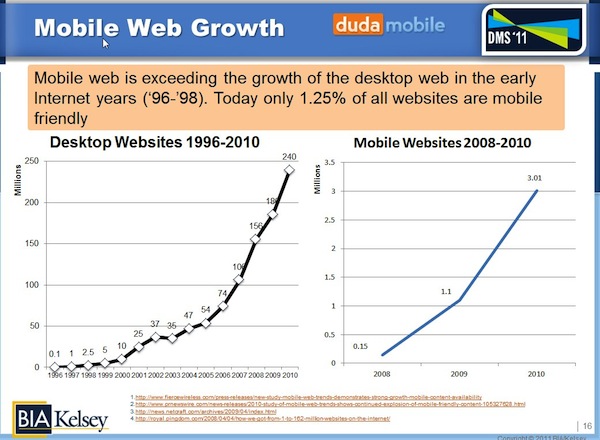I was recently questioned by a colleague who was surprised to learn after all the talk about mobile apps and smartphones, that Google doesn’t have a library of apps. By that, I mean Google lacks native apps for platforms like iOS, Blackberry, Windows Phone, and yes, Android.
This is the heart of the industry-wide “apps vs. mobile web†debate. Apple wants an app-centric world because it gets 30 percent of app sales. It also wants the functionality endemic to native apps in order to maintain the quality standard that sells iPhones.
Google on the other hand wants a mobile Web-centric world because, put simply, that’s where search happens. Conversely, think of the lessened need for search while you are within narrowly-defined sets of content and functionality, otherwise known as apps.
But there are still user expectations for app-based home screen navigation, which Google doesn’t want to forgo on Android handsets. Here’s where web apps come in. Think of them as glorified bookmarks: websites masquerading as apps on smartphone homescreens throughout the land.

Wild Wild Web
Many believe apps vs. mobile web isn’t really a debate because the right answer is “bothâ€. That’s slightly Utopian as the real world contains resource constraints for mobile product developers who must decide, if not which platform to develop for – at least which one to develop first.
Though comScore puts app and mobile web use at parity, there has been much greater attention and resources devoted to mobile app development. For developers, there’s greater functionality in smartphone SDKs, and for users it’s a warm fuzzy environment (i.e. app stores), to discover apps.
Compare that to the mobile web which is reminiscent of the wild west that was the early desktop web. Content is under-optimized and hard to get to. Mobile website developer Duda mobile measures 1.25 percent of websites to be optimized for mobile. Google says 21 percent of its advertisers have optimized sites.
In addition to lack of content, another gating factor for users is the search process within the mobile browser. Rather than lots of finger tapping to search a mobile web that is under-optimized, many smartphone users – especially on iOS – have opted for the decidedly more user-friendly app route.
But this will turn around: though apps aren’t going anywhere, we’ll see more growth in development of mobile websites over the coming years. In the past few weeks alone, we’ve seen this from OpenTable, Wine.com, and of course Google has long relied on web apps over native.
Having less to do with which tech heavyweight is backing the standard, the shift to web apps is more a function of economics. It’s cheaper for developers to build and maintain a mobile website than an app; and you’re available to any phone with a mobile browser, rather than the fragmented OS scene.
Of course there are quality advantages with native apps, but HTML5Â provides app-like functionality for mobile sites. That of course will be difficult for things like high end games or apps that need more direct access to the graphics chip and processor. But for many apps, it’s sufficient.
But what about discovery? The challenge of finding websites, compared to app store search, is one of their biggest stumbling blocks as mentioned. But this will ease up with the combination of more intuitive search like voice and visual (i.e. Siri), and a mobile web that isn’t so daunting.

GoMo, Young Man
It’s no surprise that the company taking the biggest steps to solve some of these problems is Google. One of its biggest mobile initiatives of late is to support mobile websites that are optimized for the mobile browser (rather than being a scaled down version of the full desktop site).
This started in September when Google announced that it will bring mobile website optimization (or lack thereof) into its ranking factors for mobile search quality score. This of course applies to its mobile search algorithm only (doesn’t affect desktop).
In other words, any site that wants to rank higher in Google mobile search – a growing source of engaged, local, and commercially geared traffic – has to get itself in order. Besides being de-ranked, there’s other evidence that lost business results from un-optimized mobile sites.
Joining this effort is the recently launched “GoMo” campaign. This is an online educational resource for businesses to optimize their sites. It includes a list of endorsed vendors and even a simulator (“gomometerâ€) to see how your current site looks on mobile.
Though an un-optimized experience reflects more on the site itself than on Google, the search giant is in a game of “help us help youâ€. Together, both entities win by way of more traffic and search volume. The latter slowly happens through the reinforcement of the quality of the mobile web.
As this propagates, more mobile sites will be built, necessitating someone to index and make sense of it all… Guess who? But there could be even more on the line here for Google than where it previously hung its hat. 65% online search market share is eclipsed in mobile…where it owns 95% of search.
Register now for SES London 2012, the Leading Search Social Marketing Event, taking place 20-24 February, 2012. SES Conference Expo features presentations and panel discussions that cover all aspects of search engine-related promotion. Hurry, early bird rate expires February 3!
Article source: http://searchenginewatch.com/article/2127356/Googles-Battle-for-the-Mobile-Web
